Deloitte Case Study: Organisational Behaviour, Motivation and Teams
VerifiedAdded on 2023/06/12
|15
|4887
|140
Report
AI Summary
This report analyses organisational behaviour within Deloitte, focusing on how culture, politics, and power influence individual and team performance. It evaluates content and process theories of motivation, such as Maslow's hierarchy of needs and Herzberg's two-factor theory, and motivational techniques for effective goal achievement. The report also explains the characteristics of effective versus ineffective teams. Key concepts like legitimate, reward, referent, informational, and expert power are discussed. Organisational politics, including its impact on productivity and worker morale, is examined, along with the role of organisational culture (power and task cultures). The analysis aims to provide insights into improving organisational effectiveness and employee motivation within Deloitte. Desklib provides access to similar reports and study resources for students.
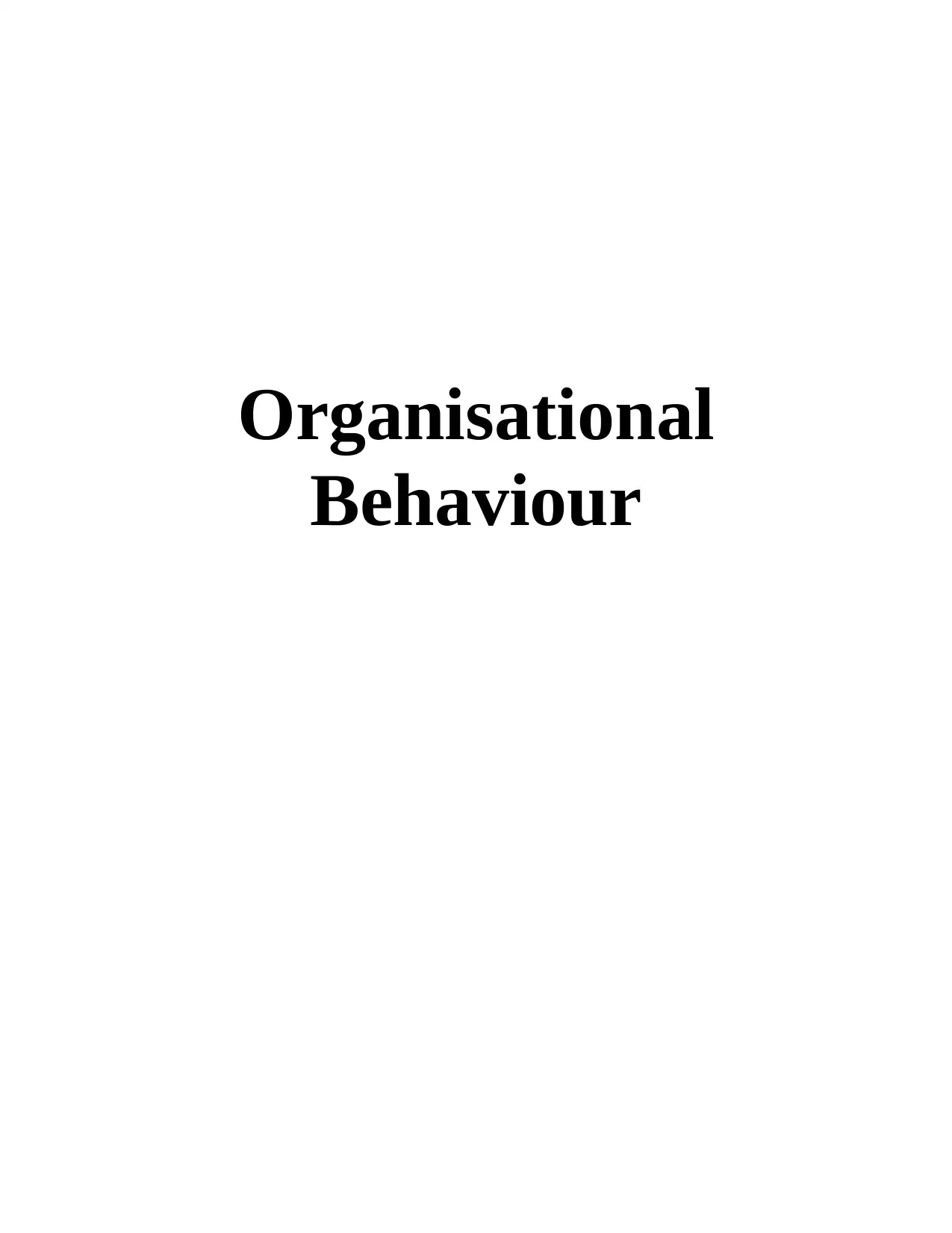
Organisational
Behaviour
Behaviour
Paraphrase This Document
Need a fresh take? Get an instant paraphrase of this document with our AI Paraphraser
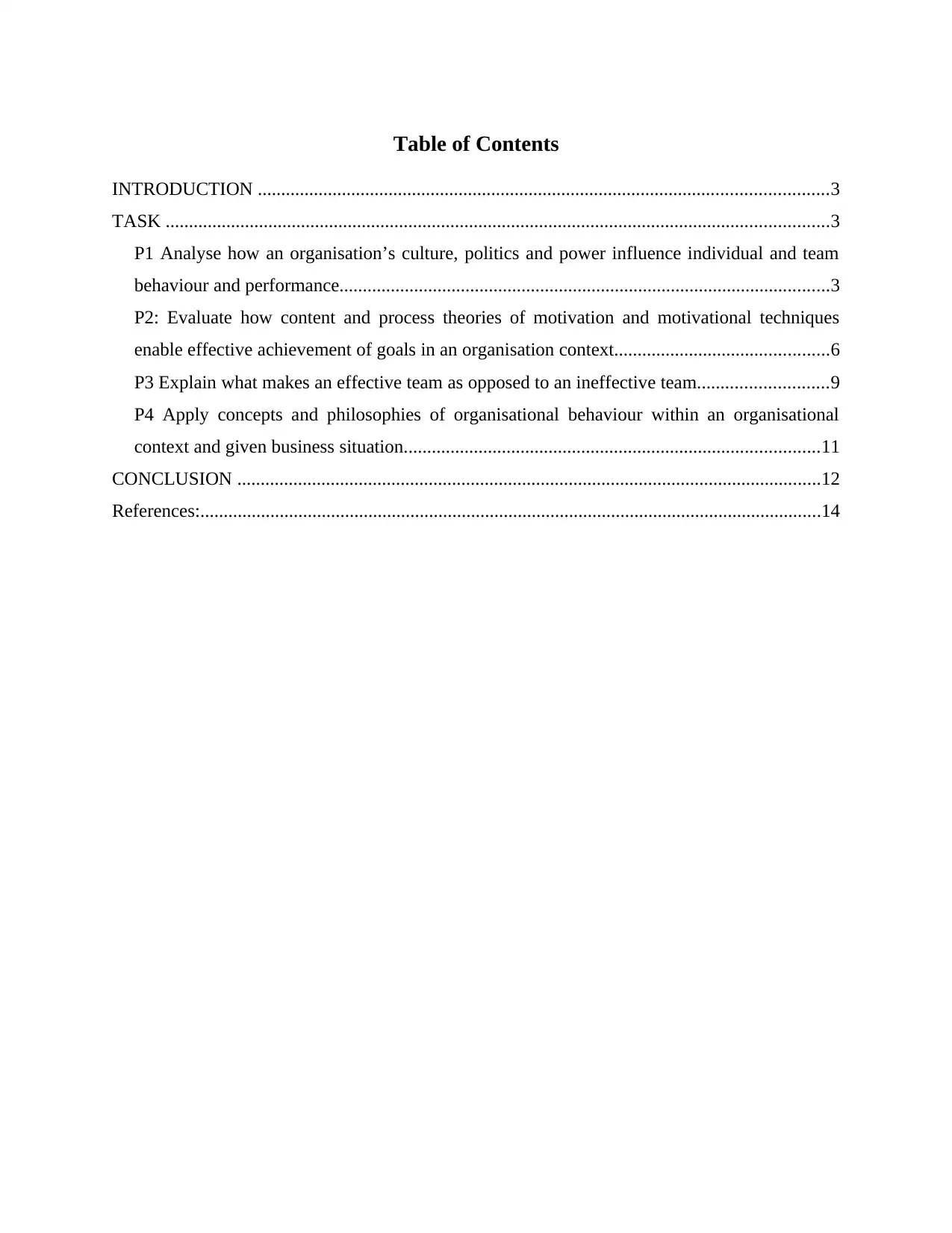
Table of Contents
INTRODUCTION ..........................................................................................................................3
TASK ..............................................................................................................................................3
P1 Analyse how an organisation’s culture, politics and power influence individual and team
behaviour and performance.........................................................................................................3
P2: Evaluate how content and process theories of motivation and motivational techniques
enable effective achievement of goals in an organisation context..............................................6
P3 Explain what makes an effective team as opposed to an ineffective team............................9
P4 Apply concepts and philosophies of organisational behaviour within an organisational
context and given business situation.........................................................................................11
CONCLUSION .............................................................................................................................12
References:.....................................................................................................................................14
INTRODUCTION ..........................................................................................................................3
TASK ..............................................................................................................................................3
P1 Analyse how an organisation’s culture, politics and power influence individual and team
behaviour and performance.........................................................................................................3
P2: Evaluate how content and process theories of motivation and motivational techniques
enable effective achievement of goals in an organisation context..............................................6
P3 Explain what makes an effective team as opposed to an ineffective team............................9
P4 Apply concepts and philosophies of organisational behaviour within an organisational
context and given business situation.........................................................................................11
CONCLUSION .............................................................................................................................12
References:.....................................................................................................................................14
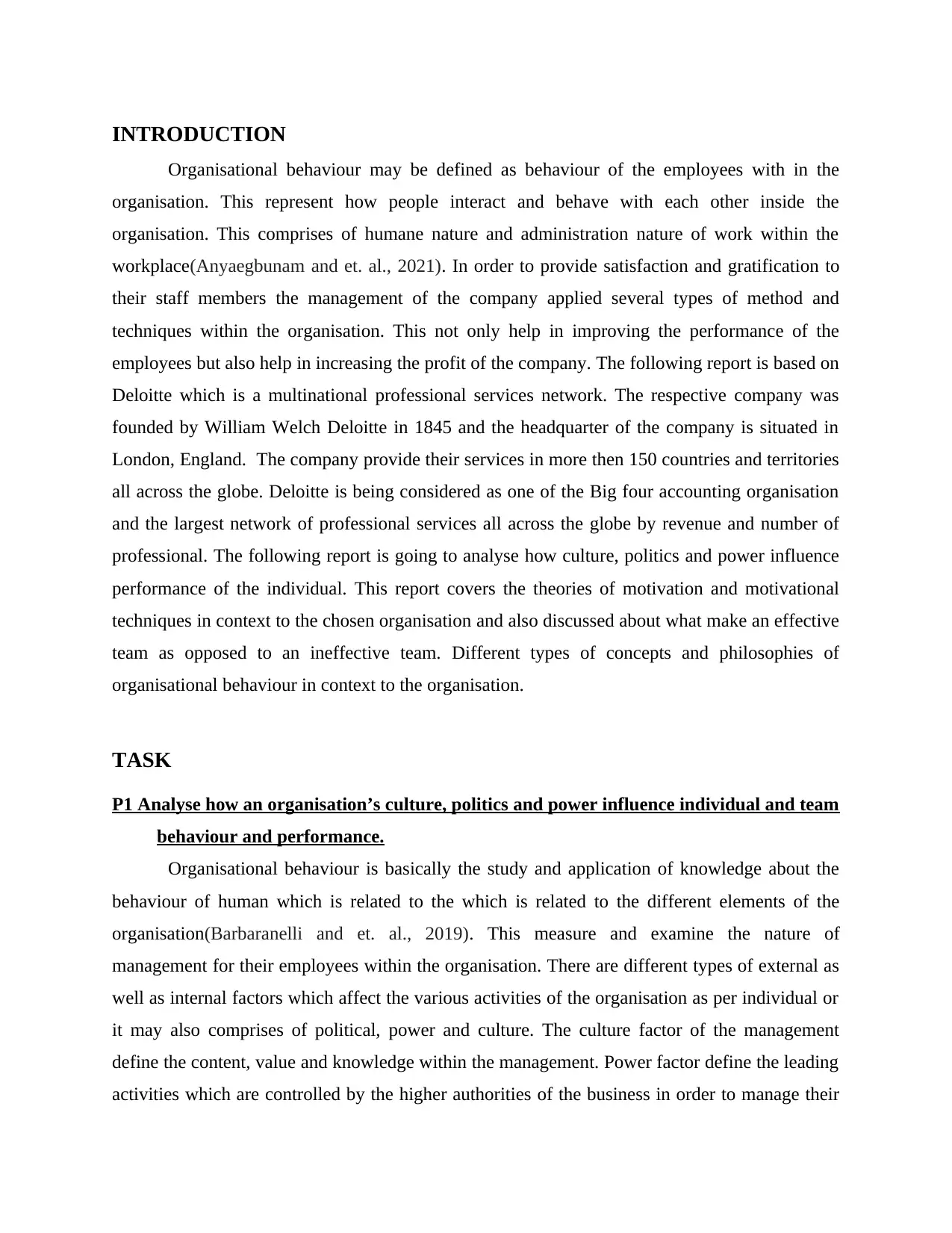
INTRODUCTION
Organisational behaviour may be defined as behaviour of the employees with in the
organisation. This represent how people interact and behave with each other inside the
organisation. This comprises of humane nature and administration nature of work within the
workplace(Anyaegbunam and et. al., 2021). In order to provide satisfaction and gratification to
their staff members the management of the company applied several types of method and
techniques within the organisation. This not only help in improving the performance of the
employees but also help in increasing the profit of the company. The following report is based on
Deloitte which is a multinational professional services network. The respective company was
founded by William Welch Deloitte in 1845 and the headquarter of the company is situated in
London, England. The company provide their services in more then 150 countries and territories
all across the globe. Deloitte is being considered as one of the Big four accounting organisation
and the largest network of professional services all across the globe by revenue and number of
professional. The following report is going to analyse how culture, politics and power influence
performance of the individual. This report covers the theories of motivation and motivational
techniques in context to the chosen organisation and also discussed about what make an effective
team as opposed to an ineffective team. Different types of concepts and philosophies of
organisational behaviour in context to the organisation.
TASK
P1 Analyse how an organisation’s culture, politics and power influence individual and team
behaviour and performance.
Organisational behaviour is basically the study and application of knowledge about the
behaviour of human which is related to the which is related to the different elements of the
organisation(Barbaranelli and et. al., 2019). This measure and examine the nature of
management for their employees within the organisation. There are different types of external as
well as internal factors which affect the various activities of the organisation as per individual or
it may also comprises of political, power and culture. The culture factor of the management
define the content, value and knowledge within the management. Power factor define the leading
activities which are controlled by the higher authorities of the business in order to manage their
Organisational behaviour may be defined as behaviour of the employees with in the
organisation. This represent how people interact and behave with each other inside the
organisation. This comprises of humane nature and administration nature of work within the
workplace(Anyaegbunam and et. al., 2021). In order to provide satisfaction and gratification to
their staff members the management of the company applied several types of method and
techniques within the organisation. This not only help in improving the performance of the
employees but also help in increasing the profit of the company. The following report is based on
Deloitte which is a multinational professional services network. The respective company was
founded by William Welch Deloitte in 1845 and the headquarter of the company is situated in
London, England. The company provide their services in more then 150 countries and territories
all across the globe. Deloitte is being considered as one of the Big four accounting organisation
and the largest network of professional services all across the globe by revenue and number of
professional. The following report is going to analyse how culture, politics and power influence
performance of the individual. This report covers the theories of motivation and motivational
techniques in context to the chosen organisation and also discussed about what make an effective
team as opposed to an ineffective team. Different types of concepts and philosophies of
organisational behaviour in context to the organisation.
TASK
P1 Analyse how an organisation’s culture, politics and power influence individual and team
behaviour and performance.
Organisational behaviour is basically the study and application of knowledge about the
behaviour of human which is related to the which is related to the different elements of the
organisation(Barbaranelli and et. al., 2019). This measure and examine the nature of
management for their employees within the organisation. There are different types of external as
well as internal factors which affect the various activities of the organisation as per individual or
it may also comprises of political, power and culture. The culture factor of the management
define the content, value and knowledge within the management. Power factor define the leading
activities which are controlled by the higher authorities of the business in order to manage their
⊘ This is a preview!⊘
Do you want full access?
Subscribe today to unlock all pages.

Trusted by 1+ million students worldwide
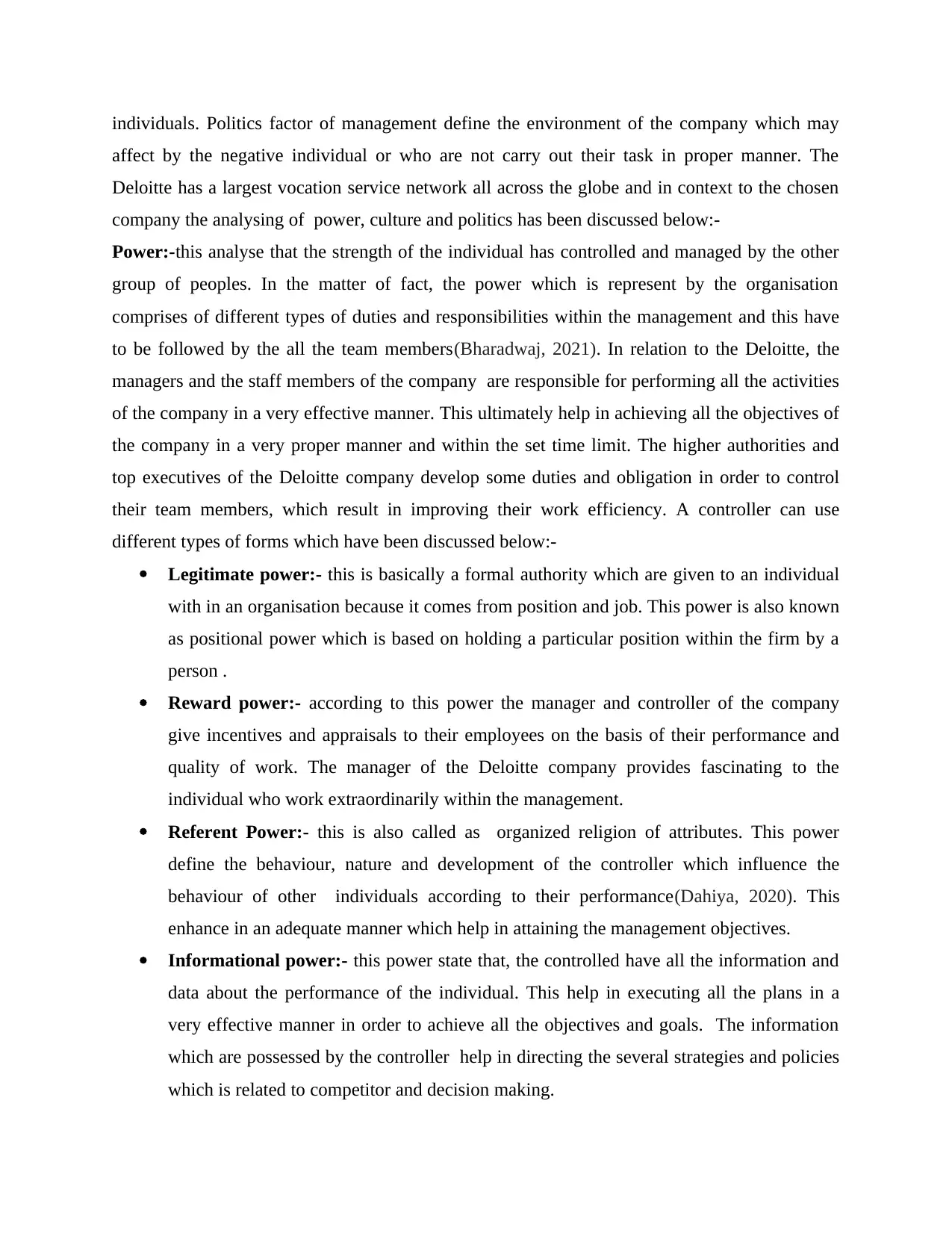
individuals. Politics factor of management define the environment of the company which may
affect by the negative individual or who are not carry out their task in proper manner. The
Deloitte has a largest vocation service network all across the globe and in context to the chosen
company the analysing of power, culture and politics has been discussed below:-
Power:-this analyse that the strength of the individual has controlled and managed by the other
group of peoples. In the matter of fact, the power which is represent by the organisation
comprises of different types of duties and responsibilities within the management and this have
to be followed by the all the team members(Bharadwaj, 2021). In relation to the Deloitte, the
managers and the staff members of the company are responsible for performing all the activities
of the company in a very effective manner. This ultimately help in achieving all the objectives of
the company in a very proper manner and within the set time limit. The higher authorities and
top executives of the Deloitte company develop some duties and obligation in order to control
their team members, which result in improving their work efficiency. A controller can use
different types of forms which have been discussed below:-
Legitimate power:- this is basically a formal authority which are given to an individual
with in an organisation because it comes from position and job. This power is also known
as positional power which is based on holding a particular position within the firm by a
person .
Reward power:- according to this power the manager and controller of the company
give incentives and appraisals to their employees on the basis of their performance and
quality of work. The manager of the Deloitte company provides fascinating to the
individual who work extraordinarily within the management.
Referent Power:- this is also called as organized religion of attributes. This power
define the behaviour, nature and development of the controller which influence the
behaviour of other individuals according to their performance(Dahiya, 2020). This
enhance in an adequate manner which help in attaining the management objectives.
Informational power:- this power state that, the controlled have all the information and
data about the performance of the individual. This help in executing all the plans in a
very effective manner in order to achieve all the objectives and goals. The information
which are possessed by the controller help in directing the several strategies and policies
which is related to competitor and decision making.
affect by the negative individual or who are not carry out their task in proper manner. The
Deloitte has a largest vocation service network all across the globe and in context to the chosen
company the analysing of power, culture and politics has been discussed below:-
Power:-this analyse that the strength of the individual has controlled and managed by the other
group of peoples. In the matter of fact, the power which is represent by the organisation
comprises of different types of duties and responsibilities within the management and this have
to be followed by the all the team members(Bharadwaj, 2021). In relation to the Deloitte, the
managers and the staff members of the company are responsible for performing all the activities
of the company in a very effective manner. This ultimately help in achieving all the objectives of
the company in a very proper manner and within the set time limit. The higher authorities and
top executives of the Deloitte company develop some duties and obligation in order to control
their team members, which result in improving their work efficiency. A controller can use
different types of forms which have been discussed below:-
Legitimate power:- this is basically a formal authority which are given to an individual
with in an organisation because it comes from position and job. This power is also known
as positional power which is based on holding a particular position within the firm by a
person .
Reward power:- according to this power the manager and controller of the company
give incentives and appraisals to their employees on the basis of their performance and
quality of work. The manager of the Deloitte company provides fascinating to the
individual who work extraordinarily within the management.
Referent Power:- this is also called as organized religion of attributes. This power
define the behaviour, nature and development of the controller which influence the
behaviour of other individuals according to their performance(Dahiya, 2020). This
enhance in an adequate manner which help in attaining the management objectives.
Informational power:- this power state that, the controlled have all the information and
data about the performance of the individual. This help in executing all the plans in a
very effective manner in order to achieve all the objectives and goals. The information
which are possessed by the controller help in directing the several strategies and policies
which is related to competitor and decision making.
Paraphrase This Document
Need a fresh take? Get an instant paraphrase of this document with our AI Paraphraser
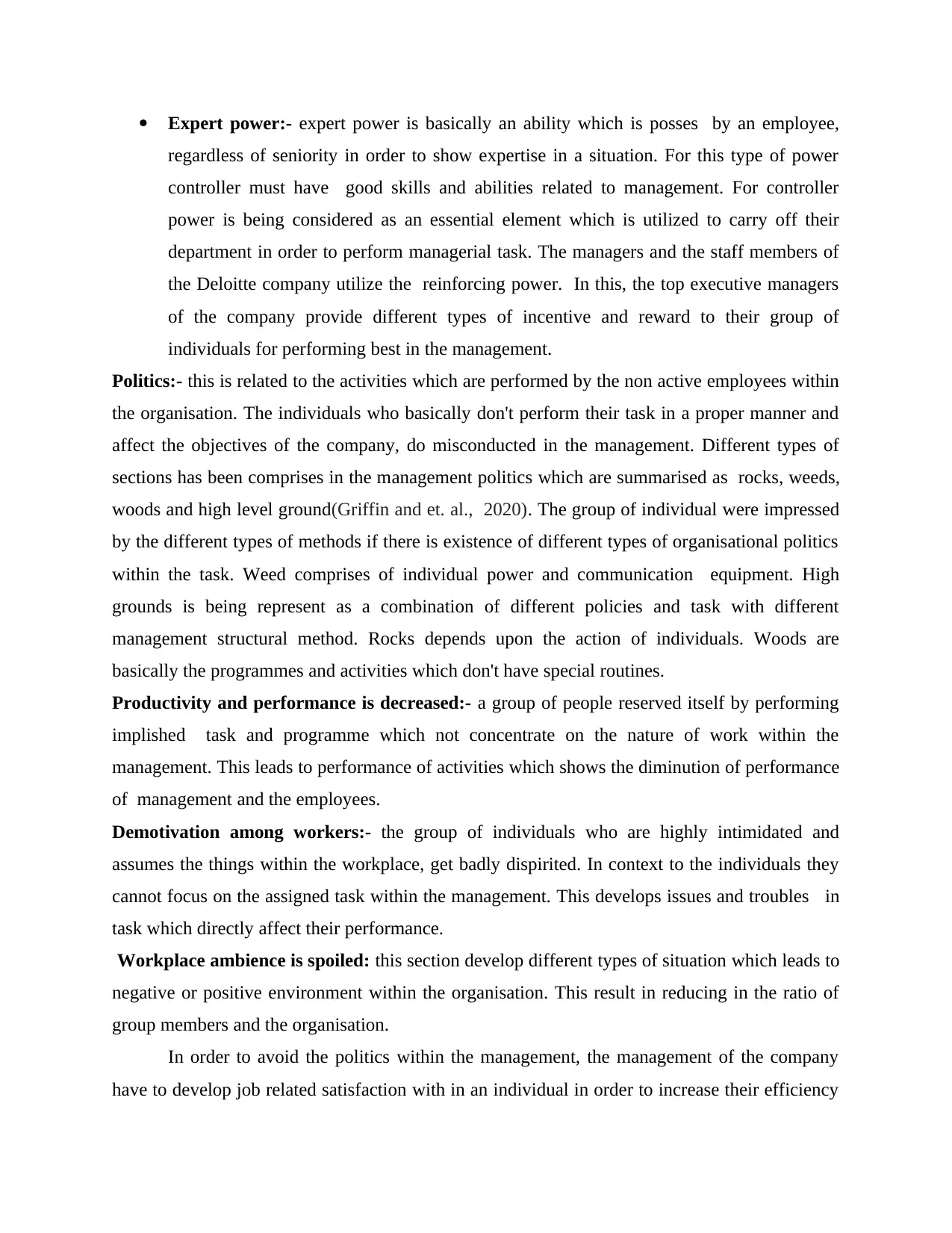
Expert power:- expert power is basically an ability which is posses by an employee,
regardless of seniority in order to show expertise in a situation. For this type of power
controller must have good skills and abilities related to management. For controller
power is being considered as an essential element which is utilized to carry off their
department in order to perform managerial task. The managers and the staff members of
the Deloitte company utilize the reinforcing power. In this, the top executive managers
of the company provide different types of incentive and reward to their group of
individuals for performing best in the management.
Politics:- this is related to the activities which are performed by the non active employees within
the organisation. The individuals who basically don't perform their task in a proper manner and
affect the objectives of the company, do misconducted in the management. Different types of
sections has been comprises in the management politics which are summarised as rocks, weeds,
woods and high level ground(Griffin and et. al., 2020). The group of individual were impressed
by the different types of methods if there is existence of different types of organisational politics
within the task. Weed comprises of individual power and communication equipment. High
grounds is being represent as a combination of different policies and task with different
management structural method. Rocks depends upon the action of individuals. Woods are
basically the programmes and activities which don't have special routines.
Productivity and performance is decreased:- a group of people reserved itself by performing
implished task and programme which not concentrate on the nature of work within the
management. This leads to performance of activities which shows the diminution of performance
of management and the employees.
Demotivation among workers:- the group of individuals who are highly intimidated and
assumes the things within the workplace, get badly dispirited. In context to the individuals they
cannot focus on the assigned task within the management. This develops issues and troubles in
task which directly affect their performance.
Workplace ambience is spoiled: this section develop different types of situation which leads to
negative or positive environment within the organisation. This result in reducing in the ratio of
group members and the organisation.
In order to avoid the politics within the management, the management of the company
have to develop job related satisfaction with in an individual in order to increase their efficiency
regardless of seniority in order to show expertise in a situation. For this type of power
controller must have good skills and abilities related to management. For controller
power is being considered as an essential element which is utilized to carry off their
department in order to perform managerial task. The managers and the staff members of
the Deloitte company utilize the reinforcing power. In this, the top executive managers
of the company provide different types of incentive and reward to their group of
individuals for performing best in the management.
Politics:- this is related to the activities which are performed by the non active employees within
the organisation. The individuals who basically don't perform their task in a proper manner and
affect the objectives of the company, do misconducted in the management. Different types of
sections has been comprises in the management politics which are summarised as rocks, weeds,
woods and high level ground(Griffin and et. al., 2020). The group of individual were impressed
by the different types of methods if there is existence of different types of organisational politics
within the task. Weed comprises of individual power and communication equipment. High
grounds is being represent as a combination of different policies and task with different
management structural method. Rocks depends upon the action of individuals. Woods are
basically the programmes and activities which don't have special routines.
Productivity and performance is decreased:- a group of people reserved itself by performing
implished task and programme which not concentrate on the nature of work within the
management. This leads to performance of activities which shows the diminution of performance
of management and the employees.
Demotivation among workers:- the group of individuals who are highly intimidated and
assumes the things within the workplace, get badly dispirited. In context to the individuals they
cannot focus on the assigned task within the management. This develops issues and troubles in
task which directly affect their performance.
Workplace ambience is spoiled: this section develop different types of situation which leads to
negative or positive environment within the organisation. This result in reducing in the ratio of
group members and the organisation.
In order to avoid the politics within the management, the management of the company
have to develop job related satisfaction with in an individual in order to increase their efficiency
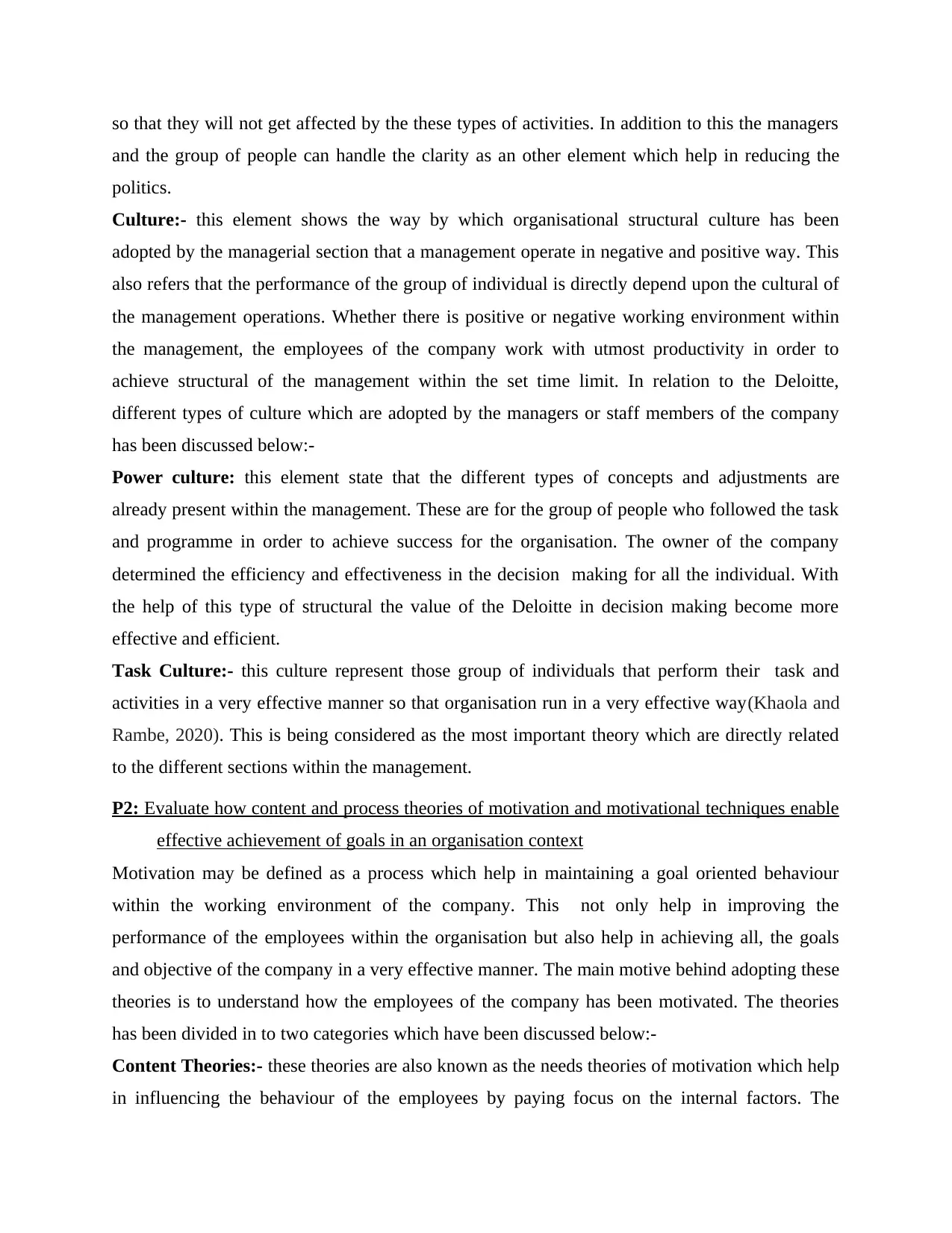
so that they will not get affected by the these types of activities. In addition to this the managers
and the group of people can handle the clarity as an other element which help in reducing the
politics.
Culture:- this element shows the way by which organisational structural culture has been
adopted by the managerial section that a management operate in negative and positive way. This
also refers that the performance of the group of individual is directly depend upon the cultural of
the management operations. Whether there is positive or negative working environment within
the management, the employees of the company work with utmost productivity in order to
achieve structural of the management within the set time limit. In relation to the Deloitte,
different types of culture which are adopted by the managers or staff members of the company
has been discussed below:-
Power culture: this element state that the different types of concepts and adjustments are
already present within the management. These are for the group of people who followed the task
and programme in order to achieve success for the organisation. The owner of the company
determined the efficiency and effectiveness in the decision making for all the individual. With
the help of this type of structural the value of the Deloitte in decision making become more
effective and efficient.
Task Culture:- this culture represent those group of individuals that perform their task and
activities in a very effective manner so that organisation run in a very effective way(Khaola and
Rambe, 2020). This is being considered as the most important theory which are directly related
to the different sections within the management.
P2: Evaluate how content and process theories of motivation and motivational techniques enable
effective achievement of goals in an organisation context
Motivation may be defined as a process which help in maintaining a goal oriented behaviour
within the working environment of the company. This not only help in improving the
performance of the employees within the organisation but also help in achieving all, the goals
and objective of the company in a very effective manner. The main motive behind adopting these
theories is to understand how the employees of the company has been motivated. The theories
has been divided in to two categories which have been discussed below:-
Content Theories:- these theories are also known as the needs theories of motivation which help
in influencing the behaviour of the employees by paying focus on the internal factors. The
and the group of people can handle the clarity as an other element which help in reducing the
politics.
Culture:- this element shows the way by which organisational structural culture has been
adopted by the managerial section that a management operate in negative and positive way. This
also refers that the performance of the group of individual is directly depend upon the cultural of
the management operations. Whether there is positive or negative working environment within
the management, the employees of the company work with utmost productivity in order to
achieve structural of the management within the set time limit. In relation to the Deloitte,
different types of culture which are adopted by the managers or staff members of the company
has been discussed below:-
Power culture: this element state that the different types of concepts and adjustments are
already present within the management. These are for the group of people who followed the task
and programme in order to achieve success for the organisation. The owner of the company
determined the efficiency and effectiveness in the decision making for all the individual. With
the help of this type of structural the value of the Deloitte in decision making become more
effective and efficient.
Task Culture:- this culture represent those group of individuals that perform their task and
activities in a very effective manner so that organisation run in a very effective way(Khaola and
Rambe, 2020). This is being considered as the most important theory which are directly related
to the different sections within the management.
P2: Evaluate how content and process theories of motivation and motivational techniques enable
effective achievement of goals in an organisation context
Motivation may be defined as a process which help in maintaining a goal oriented behaviour
within the working environment of the company. This not only help in improving the
performance of the employees within the organisation but also help in achieving all, the goals
and objective of the company in a very effective manner. The main motive behind adopting these
theories is to understand how the employees of the company has been motivated. The theories
has been divided in to two categories which have been discussed below:-
Content Theories:- these theories are also known as the needs theories of motivation which help
in influencing the behaviour of the employees by paying focus on the internal factors. The
⊘ This is a preview!⊘
Do you want full access?
Subscribe today to unlock all pages.

Trusted by 1+ million students worldwide
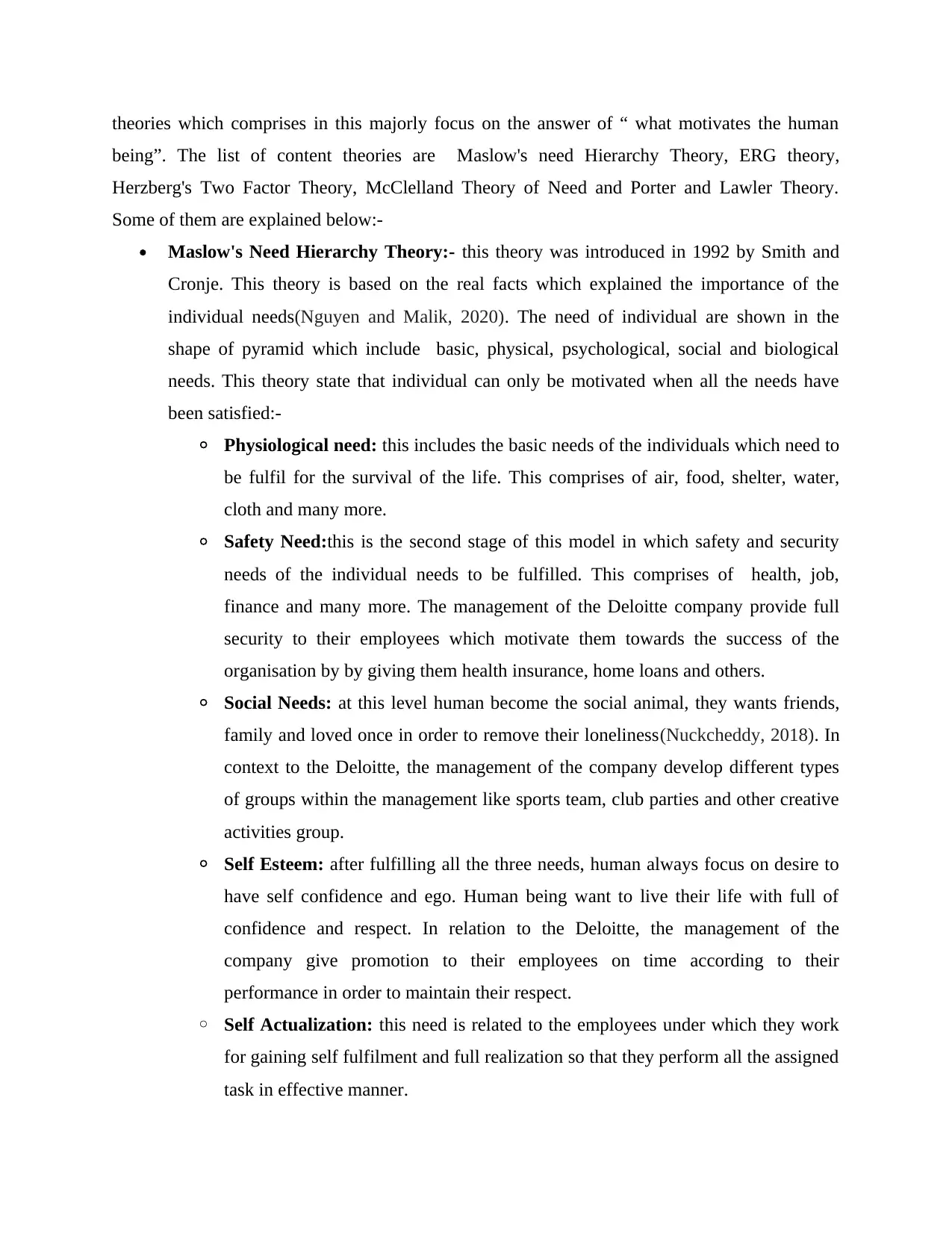
theories which comprises in this majorly focus on the answer of “ what motivates the human
being”. The list of content theories are Maslow's need Hierarchy Theory, ERG theory,
Herzberg's Two Factor Theory, McClelland Theory of Need and Porter and Lawler Theory.
Some of them are explained below:-
Maslow's Need Hierarchy Theory:- this theory was introduced in 1992 by Smith and
Cronje. This theory is based on the real facts which explained the importance of the
individual needs(Nguyen and Malik, 2020). The need of individual are shown in the
shape of pyramid which include basic, physical, psychological, social and biological
needs. This theory state that individual can only be motivated when all the needs have
been satisfied:-
◦ Physiological need: this includes the basic needs of the individuals which need to
be fulfil for the survival of the life. This comprises of air, food, shelter, water,
cloth and many more.
◦ Safety Need:this is the second stage of this model in which safety and security
needs of the individual needs to be fulfilled. This comprises of health, job,
finance and many more. The management of the Deloitte company provide full
security to their employees which motivate them towards the success of the
organisation by by giving them health insurance, home loans and others.
◦ Social Needs: at this level human become the social animal, they wants friends,
family and loved once in order to remove their loneliness(Nuckcheddy, 2018). In
context to the Deloitte, the management of the company develop different types
of groups within the management like sports team, club parties and other creative
activities group.
◦ Self Esteem: after fulfilling all the three needs, human always focus on desire to
have self confidence and ego. Human being want to live their life with full of
confidence and respect. In relation to the Deloitte, the management of the
company give promotion to their employees on time according to their
performance in order to maintain their respect.
◦ Self Actualization: this need is related to the employees under which they work
for gaining self fulfilment and full realization so that they perform all the assigned
task in effective manner.
being”. The list of content theories are Maslow's need Hierarchy Theory, ERG theory,
Herzberg's Two Factor Theory, McClelland Theory of Need and Porter and Lawler Theory.
Some of them are explained below:-
Maslow's Need Hierarchy Theory:- this theory was introduced in 1992 by Smith and
Cronje. This theory is based on the real facts which explained the importance of the
individual needs(Nguyen and Malik, 2020). The need of individual are shown in the
shape of pyramid which include basic, physical, psychological, social and biological
needs. This theory state that individual can only be motivated when all the needs have
been satisfied:-
◦ Physiological need: this includes the basic needs of the individuals which need to
be fulfil for the survival of the life. This comprises of air, food, shelter, water,
cloth and many more.
◦ Safety Need:this is the second stage of this model in which safety and security
needs of the individual needs to be fulfilled. This comprises of health, job,
finance and many more. The management of the Deloitte company provide full
security to their employees which motivate them towards the success of the
organisation by by giving them health insurance, home loans and others.
◦ Social Needs: at this level human become the social animal, they wants friends,
family and loved once in order to remove their loneliness(Nuckcheddy, 2018). In
context to the Deloitte, the management of the company develop different types
of groups within the management like sports team, club parties and other creative
activities group.
◦ Self Esteem: after fulfilling all the three needs, human always focus on desire to
have self confidence and ego. Human being want to live their life with full of
confidence and respect. In relation to the Deloitte, the management of the
company give promotion to their employees on time according to their
performance in order to maintain their respect.
◦ Self Actualization: this need is related to the employees under which they work
for gaining self fulfilment and full realization so that they perform all the assigned
task in effective manner.
Paraphrase This Document
Need a fresh take? Get an instant paraphrase of this document with our AI Paraphraser
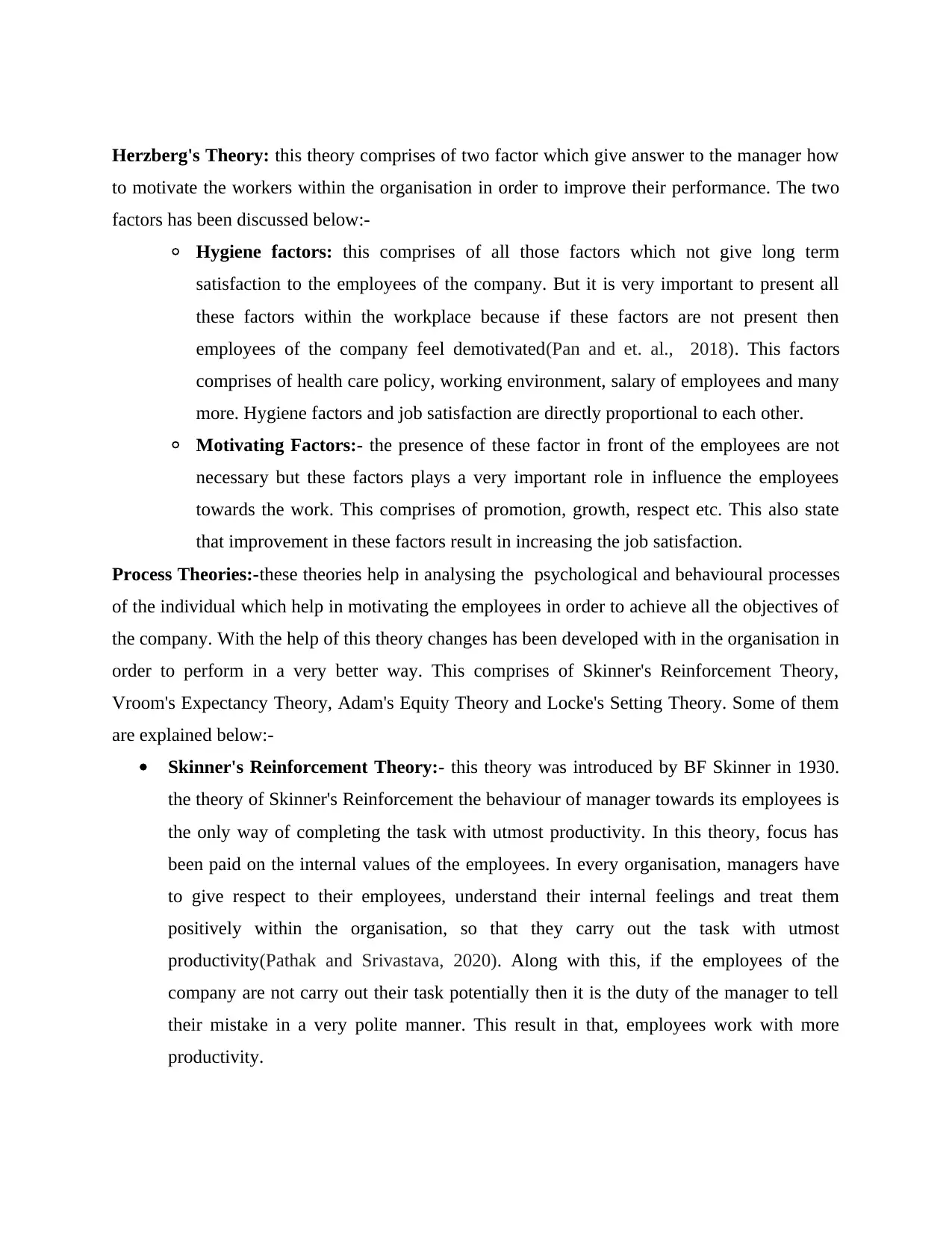
Herzberg's Theory: this theory comprises of two factor which give answer to the manager how
to motivate the workers within the organisation in order to improve their performance. The two
factors has been discussed below:-
◦ Hygiene factors: this comprises of all those factors which not give long term
satisfaction to the employees of the company. But it is very important to present all
these factors within the workplace because if these factors are not present then
employees of the company feel demotivated(Pan and et. al., 2018). This factors
comprises of health care policy, working environment, salary of employees and many
more. Hygiene factors and job satisfaction are directly proportional to each other.
◦ Motivating Factors:- the presence of these factor in front of the employees are not
necessary but these factors plays a very important role in influence the employees
towards the work. This comprises of promotion, growth, respect etc. This also state
that improvement in these factors result in increasing the job satisfaction.
Process Theories:-these theories help in analysing the psychological and behavioural processes
of the individual which help in motivating the employees in order to achieve all the objectives of
the company. With the help of this theory changes has been developed with in the organisation in
order to perform in a very better way. This comprises of Skinner's Reinforcement Theory,
Vroom's Expectancy Theory, Adam's Equity Theory and Locke's Setting Theory. Some of them
are explained below:-
Skinner's Reinforcement Theory:- this theory was introduced by BF Skinner in 1930.
the theory of Skinner's Reinforcement the behaviour of manager towards its employees is
the only way of completing the task with utmost productivity. In this theory, focus has
been paid on the internal values of the employees. In every organisation, managers have
to give respect to their employees, understand their internal feelings and treat them
positively within the organisation, so that they carry out the task with utmost
productivity(Pathak and Srivastava, 2020). Along with this, if the employees of the
company are not carry out their task potentially then it is the duty of the manager to tell
their mistake in a very polite manner. This result in that, employees work with more
productivity.
to motivate the workers within the organisation in order to improve their performance. The two
factors has been discussed below:-
◦ Hygiene factors: this comprises of all those factors which not give long term
satisfaction to the employees of the company. But it is very important to present all
these factors within the workplace because if these factors are not present then
employees of the company feel demotivated(Pan and et. al., 2018). This factors
comprises of health care policy, working environment, salary of employees and many
more. Hygiene factors and job satisfaction are directly proportional to each other.
◦ Motivating Factors:- the presence of these factor in front of the employees are not
necessary but these factors plays a very important role in influence the employees
towards the work. This comprises of promotion, growth, respect etc. This also state
that improvement in these factors result in increasing the job satisfaction.
Process Theories:-these theories help in analysing the psychological and behavioural processes
of the individual which help in motivating the employees in order to achieve all the objectives of
the company. With the help of this theory changes has been developed with in the organisation in
order to perform in a very better way. This comprises of Skinner's Reinforcement Theory,
Vroom's Expectancy Theory, Adam's Equity Theory and Locke's Setting Theory. Some of them
are explained below:-
Skinner's Reinforcement Theory:- this theory was introduced by BF Skinner in 1930.
the theory of Skinner's Reinforcement the behaviour of manager towards its employees is
the only way of completing the task with utmost productivity. In this theory, focus has
been paid on the internal values of the employees. In every organisation, managers have
to give respect to their employees, understand their internal feelings and treat them
positively within the organisation, so that they carry out the task with utmost
productivity(Pathak and Srivastava, 2020). Along with this, if the employees of the
company are not carry out their task potentially then it is the duty of the manager to tell
their mistake in a very polite manner. This result in that, employees work with more
productivity.
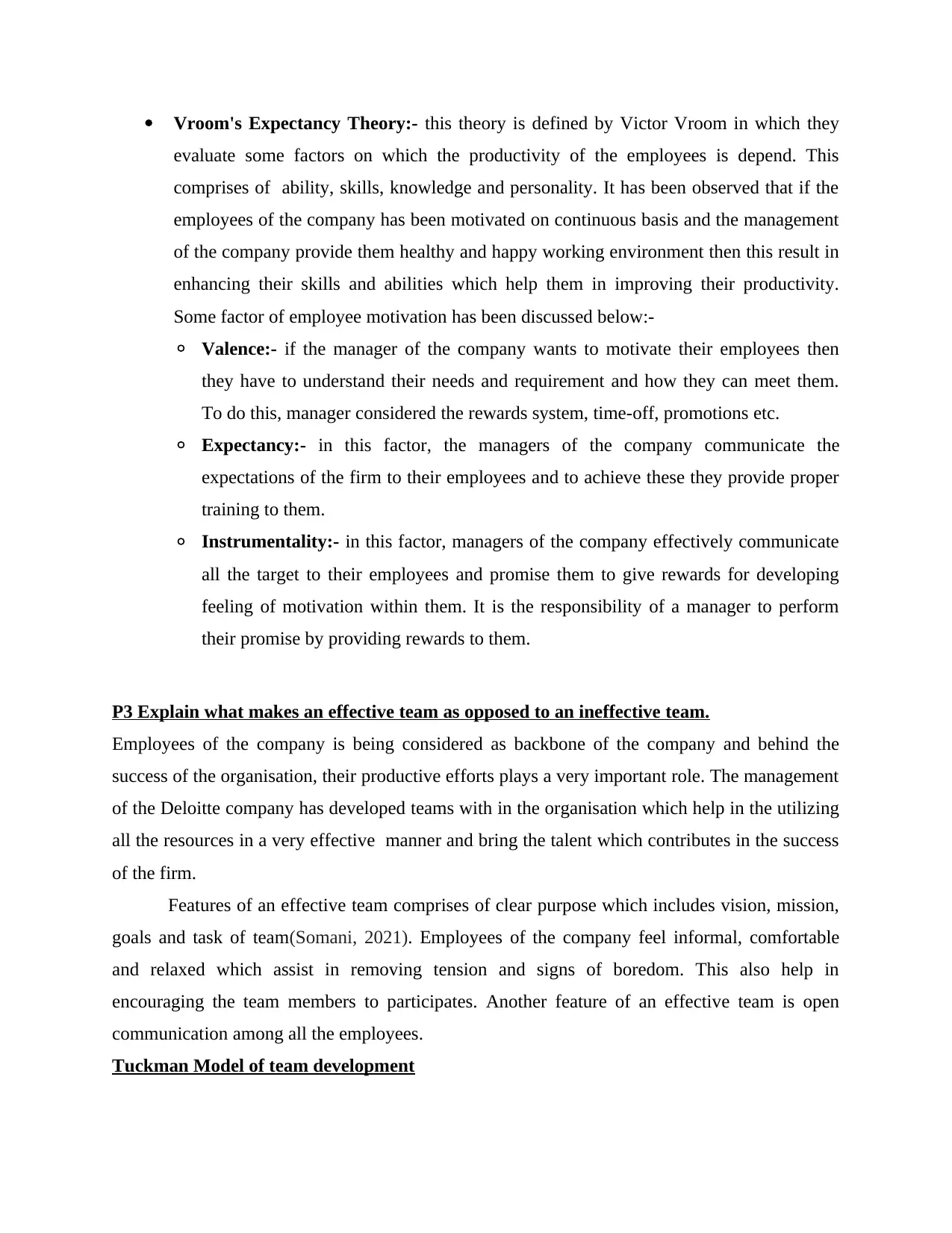
Vroom's Expectancy Theory:- this theory is defined by Victor Vroom in which they
evaluate some factors on which the productivity of the employees is depend. This
comprises of ability, skills, knowledge and personality. It has been observed that if the
employees of the company has been motivated on continuous basis and the management
of the company provide them healthy and happy working environment then this result in
enhancing their skills and abilities which help them in improving their productivity.
Some factor of employee motivation has been discussed below:-
◦ Valence:- if the manager of the company wants to motivate their employees then
they have to understand their needs and requirement and how they can meet them.
To do this, manager considered the rewards system, time-off, promotions etc.
◦ Expectancy:- in this factor, the managers of the company communicate the
expectations of the firm to their employees and to achieve these they provide proper
training to them.
◦ Instrumentality:- in this factor, managers of the company effectively communicate
all the target to their employees and promise them to give rewards for developing
feeling of motivation within them. It is the responsibility of a manager to perform
their promise by providing rewards to them.
P3 Explain what makes an effective team as opposed to an ineffective team.
Employees of the company is being considered as backbone of the company and behind the
success of the organisation, their productive efforts plays a very important role. The management
of the Deloitte company has developed teams with in the organisation which help in the utilizing
all the resources in a very effective manner and bring the talent which contributes in the success
of the firm.
Features of an effective team comprises of clear purpose which includes vision, mission,
goals and task of team(Somani, 2021). Employees of the company feel informal, comfortable
and relaxed which assist in removing tension and signs of boredom. This also help in
encouraging the team members to participates. Another feature of an effective team is open
communication among all the employees.
Tuckman Model of team development
evaluate some factors on which the productivity of the employees is depend. This
comprises of ability, skills, knowledge and personality. It has been observed that if the
employees of the company has been motivated on continuous basis and the management
of the company provide them healthy and happy working environment then this result in
enhancing their skills and abilities which help them in improving their productivity.
Some factor of employee motivation has been discussed below:-
◦ Valence:- if the manager of the company wants to motivate their employees then
they have to understand their needs and requirement and how they can meet them.
To do this, manager considered the rewards system, time-off, promotions etc.
◦ Expectancy:- in this factor, the managers of the company communicate the
expectations of the firm to their employees and to achieve these they provide proper
training to them.
◦ Instrumentality:- in this factor, managers of the company effectively communicate
all the target to their employees and promise them to give rewards for developing
feeling of motivation within them. It is the responsibility of a manager to perform
their promise by providing rewards to them.
P3 Explain what makes an effective team as opposed to an ineffective team.
Employees of the company is being considered as backbone of the company and behind the
success of the organisation, their productive efforts plays a very important role. The management
of the Deloitte company has developed teams with in the organisation which help in the utilizing
all the resources in a very effective manner and bring the talent which contributes in the success
of the firm.
Features of an effective team comprises of clear purpose which includes vision, mission,
goals and task of team(Somani, 2021). Employees of the company feel informal, comfortable
and relaxed which assist in removing tension and signs of boredom. This also help in
encouraging the team members to participates. Another feature of an effective team is open
communication among all the employees.
Tuckman Model of team development
⊘ This is a preview!⊘
Do you want full access?
Subscribe today to unlock all pages.

Trusted by 1+ million students worldwide
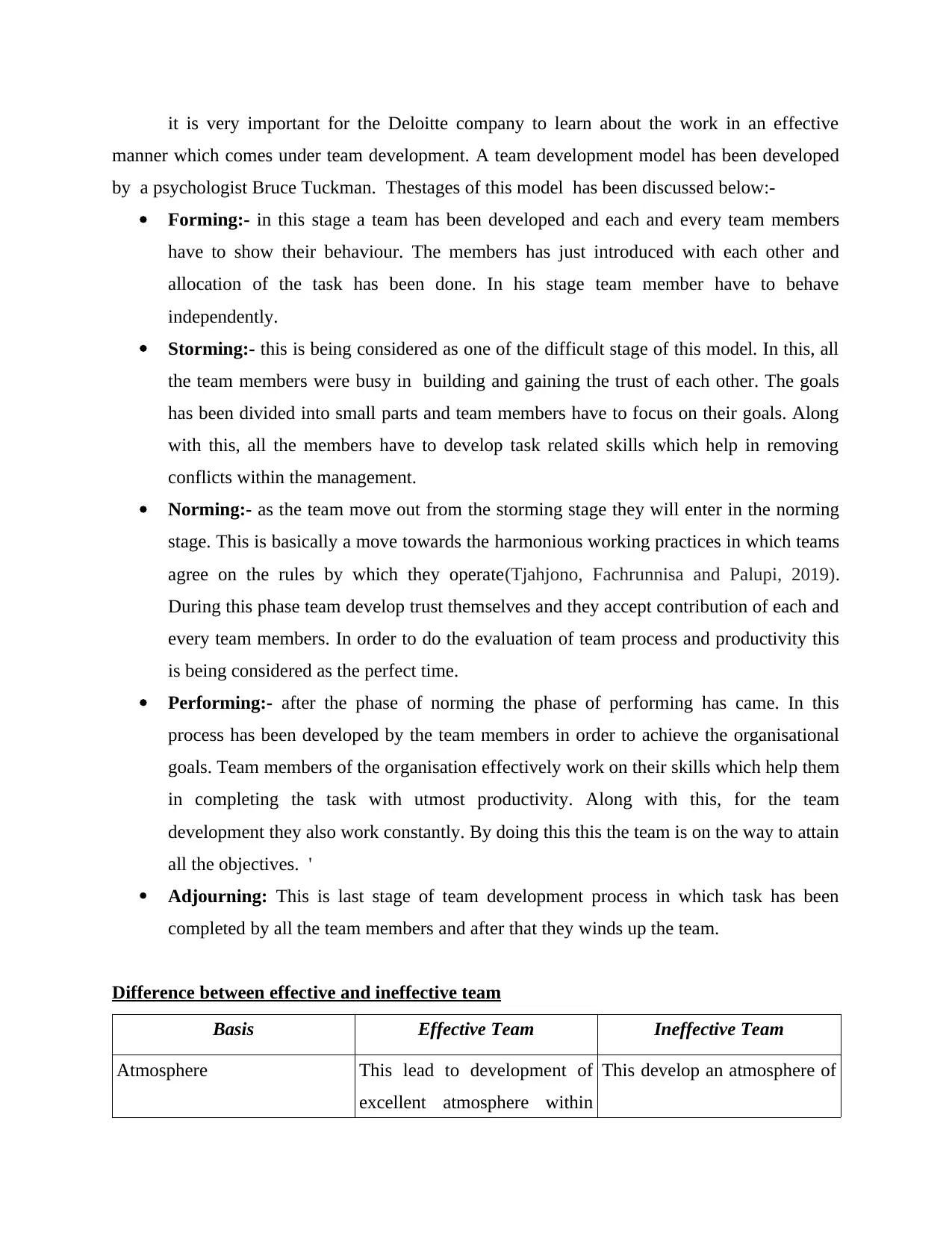
it is very important for the Deloitte company to learn about the work in an effective
manner which comes under team development. A team development model has been developed
by a psychologist Bruce Tuckman. Thestages of this model has been discussed below:-
Forming:- in this stage a team has been developed and each and every team members
have to show their behaviour. The members has just introduced with each other and
allocation of the task has been done. In his stage team member have to behave
independently.
Storming:- this is being considered as one of the difficult stage of this model. In this, all
the team members were busy in building and gaining the trust of each other. The goals
has been divided into small parts and team members have to focus on their goals. Along
with this, all the members have to develop task related skills which help in removing
conflicts within the management.
Norming:- as the team move out from the storming stage they will enter in the norming
stage. This is basically a move towards the harmonious working practices in which teams
agree on the rules by which they operate(Tjahjono, Fachrunnisa and Palupi, 2019).
During this phase team develop trust themselves and they accept contribution of each and
every team members. In order to do the evaluation of team process and productivity this
is being considered as the perfect time.
Performing:- after the phase of norming the phase of performing has came. In this
process has been developed by the team members in order to achieve the organisational
goals. Team members of the organisation effectively work on their skills which help them
in completing the task with utmost productivity. Along with this, for the team
development they also work constantly. By doing this this the team is on the way to attain
all the objectives. '
Adjourning: This is last stage of team development process in which task has been
completed by all the team members and after that they winds up the team.
Difference between effective and ineffective team
Basis Effective Team Ineffective Team
Atmosphere This lead to development of
excellent atmosphere within
This develop an atmosphere of
manner which comes under team development. A team development model has been developed
by a psychologist Bruce Tuckman. Thestages of this model has been discussed below:-
Forming:- in this stage a team has been developed and each and every team members
have to show their behaviour. The members has just introduced with each other and
allocation of the task has been done. In his stage team member have to behave
independently.
Storming:- this is being considered as one of the difficult stage of this model. In this, all
the team members were busy in building and gaining the trust of each other. The goals
has been divided into small parts and team members have to focus on their goals. Along
with this, all the members have to develop task related skills which help in removing
conflicts within the management.
Norming:- as the team move out from the storming stage they will enter in the norming
stage. This is basically a move towards the harmonious working practices in which teams
agree on the rules by which they operate(Tjahjono, Fachrunnisa and Palupi, 2019).
During this phase team develop trust themselves and they accept contribution of each and
every team members. In order to do the evaluation of team process and productivity this
is being considered as the perfect time.
Performing:- after the phase of norming the phase of performing has came. In this
process has been developed by the team members in order to achieve the organisational
goals. Team members of the organisation effectively work on their skills which help them
in completing the task with utmost productivity. Along with this, for the team
development they also work constantly. By doing this this the team is on the way to attain
all the objectives. '
Adjourning: This is last stage of team development process in which task has been
completed by all the team members and after that they winds up the team.
Difference between effective and ineffective team
Basis Effective Team Ineffective Team
Atmosphere This lead to development of
excellent atmosphere within
This develop an atmosphere of
Paraphrase This Document
Need a fresh take? Get an instant paraphrase of this document with our AI Paraphraser
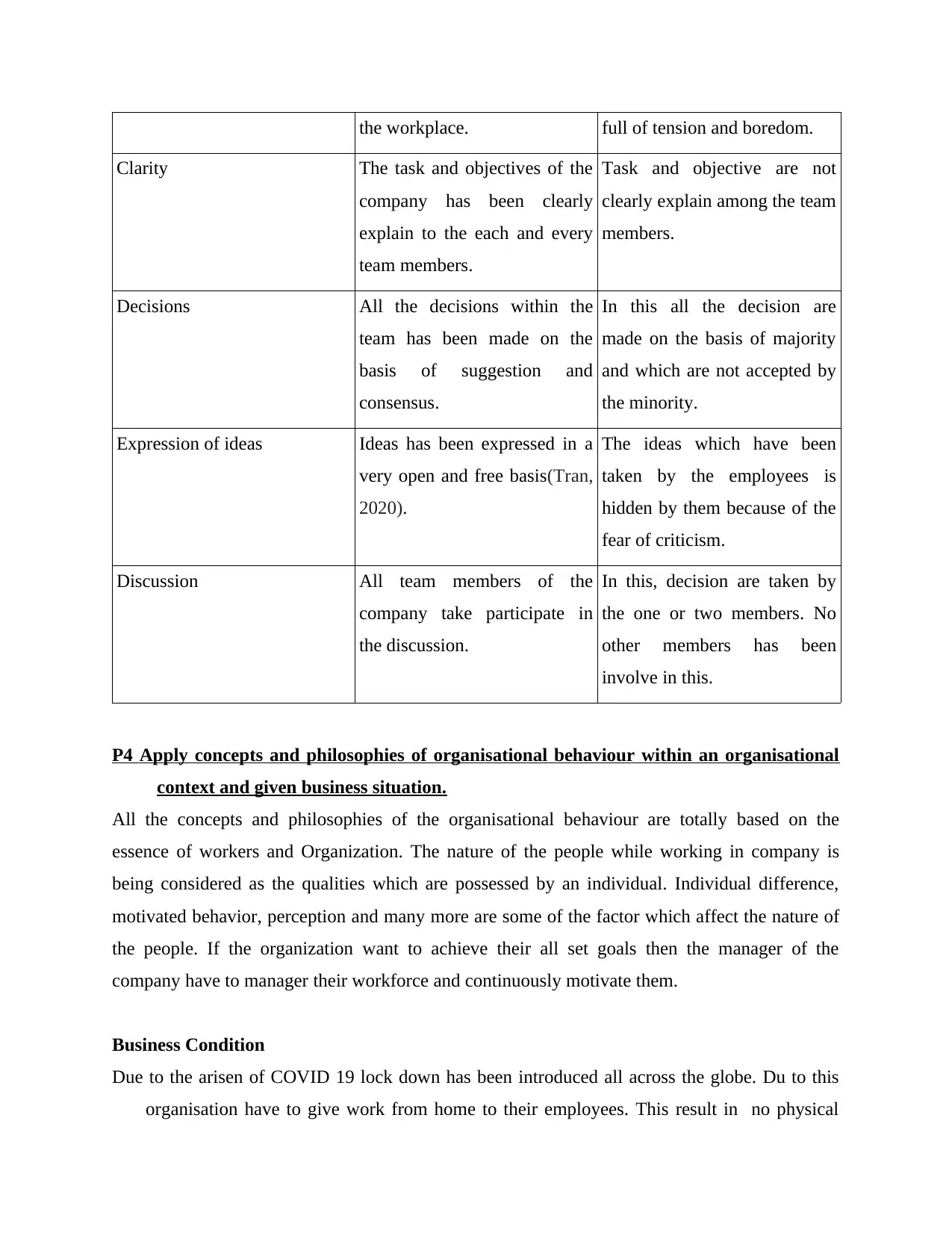
the workplace. full of tension and boredom.
Clarity The task and objectives of the
company has been clearly
explain to the each and every
team members.
Task and objective are not
clearly explain among the team
members.
Decisions All the decisions within the
team has been made on the
basis of suggestion and
consensus.
In this all the decision are
made on the basis of majority
and which are not accepted by
the minority.
Expression of ideas Ideas has been expressed in a
very open and free basis(Tran,
2020).
The ideas which have been
taken by the employees is
hidden by them because of the
fear of criticism.
Discussion All team members of the
company take participate in
the discussion.
In this, decision are taken by
the one or two members. No
other members has been
involve in this.
P4 Apply concepts and philosophies of organisational behaviour within an organisational
context and given business situation.
All the concepts and philosophies of the organisational behaviour are totally based on the
essence of workers and Organization. The nature of the people while working in company is
being considered as the qualities which are possessed by an individual. Individual difference,
motivated behavior, perception and many more are some of the factor which affect the nature of
the people. If the organization want to achieve their all set goals then the manager of the
company have to manager their workforce and continuously motivate them.
Business Condition
Due to the arisen of COVID 19 lock down has been introduced all across the globe. Du to this
organisation have to give work from home to their employees. This result in no physical
Clarity The task and objectives of the
company has been clearly
explain to the each and every
team members.
Task and objective are not
clearly explain among the team
members.
Decisions All the decisions within the
team has been made on the
basis of suggestion and
consensus.
In this all the decision are
made on the basis of majority
and which are not accepted by
the minority.
Expression of ideas Ideas has been expressed in a
very open and free basis(Tran,
2020).
The ideas which have been
taken by the employees is
hidden by them because of the
fear of criticism.
Discussion All team members of the
company take participate in
the discussion.
In this, decision are taken by
the one or two members. No
other members has been
involve in this.
P4 Apply concepts and philosophies of organisational behaviour within an organisational
context and given business situation.
All the concepts and philosophies of the organisational behaviour are totally based on the
essence of workers and Organization. The nature of the people while working in company is
being considered as the qualities which are possessed by an individual. Individual difference,
motivated behavior, perception and many more are some of the factor which affect the nature of
the people. If the organization want to achieve their all set goals then the manager of the
company have to manager their workforce and continuously motivate them.
Business Condition
Due to the arisen of COVID 19 lock down has been introduced all across the globe. Du to this
organisation have to give work from home to their employees. This result in no physical
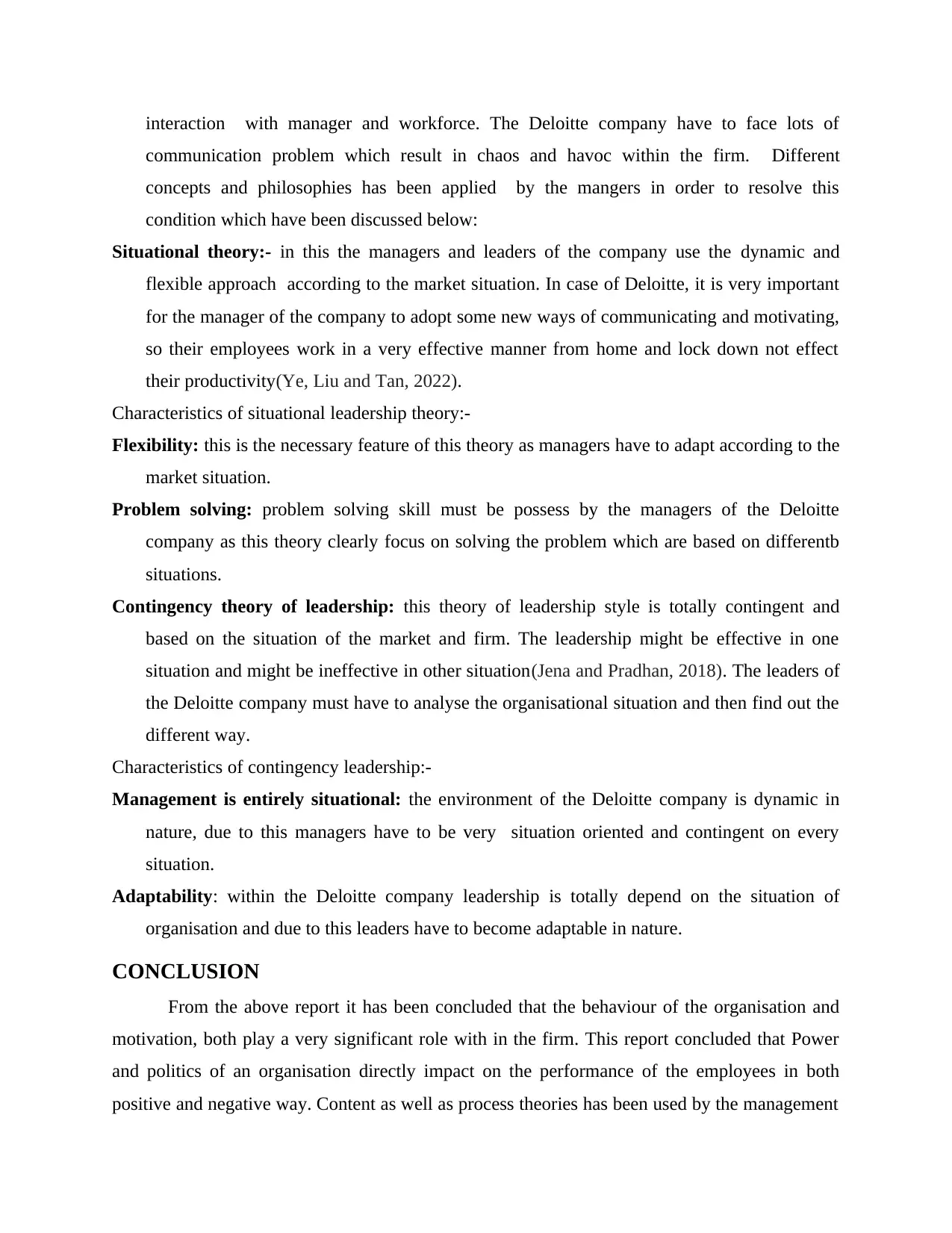
interaction with manager and workforce. The Deloitte company have to face lots of
communication problem which result in chaos and havoc within the firm. Different
concepts and philosophies has been applied by the mangers in order to resolve this
condition which have been discussed below:
Situational theory:- in this the managers and leaders of the company use the dynamic and
flexible approach according to the market situation. In case of Deloitte, it is very important
for the manager of the company to adopt some new ways of communicating and motivating,
so their employees work in a very effective manner from home and lock down not effect
their productivity(Ye, Liu and Tan, 2022).
Characteristics of situational leadership theory:-
Flexibility: this is the necessary feature of this theory as managers have to adapt according to the
market situation.
Problem solving: problem solving skill must be possess by the managers of the Deloitte
company as this theory clearly focus on solving the problem which are based on differentb
situations.
Contingency theory of leadership: this theory of leadership style is totally contingent and
based on the situation of the market and firm. The leadership might be effective in one
situation and might be ineffective in other situation(Jena and Pradhan, 2018). The leaders of
the Deloitte company must have to analyse the organisational situation and then find out the
different way.
Characteristics of contingency leadership:-
Management is entirely situational: the environment of the Deloitte company is dynamic in
nature, due to this managers have to be very situation oriented and contingent on every
situation.
Adaptability: within the Deloitte company leadership is totally depend on the situation of
organisation and due to this leaders have to become adaptable in nature.
CONCLUSION
From the above report it has been concluded that the behaviour of the organisation and
motivation, both play a very significant role with in the firm. This report concluded that Power
and politics of an organisation directly impact on the performance of the employees in both
positive and negative way. Content as well as process theories has been used by the management
communication problem which result in chaos and havoc within the firm. Different
concepts and philosophies has been applied by the mangers in order to resolve this
condition which have been discussed below:
Situational theory:- in this the managers and leaders of the company use the dynamic and
flexible approach according to the market situation. In case of Deloitte, it is very important
for the manager of the company to adopt some new ways of communicating and motivating,
so their employees work in a very effective manner from home and lock down not effect
their productivity(Ye, Liu and Tan, 2022).
Characteristics of situational leadership theory:-
Flexibility: this is the necessary feature of this theory as managers have to adapt according to the
market situation.
Problem solving: problem solving skill must be possess by the managers of the Deloitte
company as this theory clearly focus on solving the problem which are based on differentb
situations.
Contingency theory of leadership: this theory of leadership style is totally contingent and
based on the situation of the market and firm. The leadership might be effective in one
situation and might be ineffective in other situation(Jena and Pradhan, 2018). The leaders of
the Deloitte company must have to analyse the organisational situation and then find out the
different way.
Characteristics of contingency leadership:-
Management is entirely situational: the environment of the Deloitte company is dynamic in
nature, due to this managers have to be very situation oriented and contingent on every
situation.
Adaptability: within the Deloitte company leadership is totally depend on the situation of
organisation and due to this leaders have to become adaptable in nature.
CONCLUSION
From the above report it has been concluded that the behaviour of the organisation and
motivation, both play a very significant role with in the firm. This report concluded that Power
and politics of an organisation directly impact on the performance of the employees in both
positive and negative way. Content as well as process theories has been used by the management
⊘ This is a preview!⊘
Do you want full access?
Subscribe today to unlock all pages.

Trusted by 1+ million students worldwide
1 out of 15
Related Documents
Your All-in-One AI-Powered Toolkit for Academic Success.
+13062052269
info@desklib.com
Available 24*7 on WhatsApp / Email
![[object Object]](/_next/static/media/star-bottom.7253800d.svg)
Unlock your academic potential
Copyright © 2020–2026 A2Z Services. All Rights Reserved. Developed and managed by ZUCOL.


